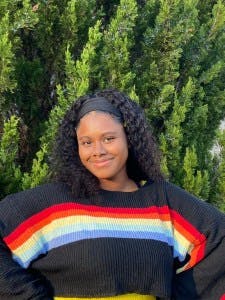Raelen Watkins (B.S.Ed. ’23) is making a difference in the lives of her peers and patients. From starting a new student organization to advocating for more diverse representation in speech-language pathology, the future Double Dawg is taking steps to increase inclusivity in all clinical settings.
- Hometown: Loganville, GA
- Degree objectives: B.S.Ed./M.Ed. in communication sciences and disorders
- Expected graduation: Spring 2023

What inspired your passion for communication sciences and disorders?
From early childhood to high school, I was interested in being a teacher. I think this stemmed from being an older sister and always having someone to guide and help grow. While taking an early childhood education class in high school, we had a speech-language pathologist (SLP) come to our class as a guest speaker. What appealed to me was that SLPs can work one-on-one with children, which is harder to do in a general education setting. As I got into my undergraduate program, I realized how little I knew about the field. My passion for communication and language grew as I progressed in the program, and I realized I could provide individuals with tools for speech, communication, and language. There’s so much diversity in the settings we work in and the clients we see, and I’m incredibly excited to keep exploring the field.
How has learning American Sign Language enhanced or changed the way you approach your work in the field?
American Sign Language (ASL) is one of the main reasons I’ve continued down this career path. The Deaf language and culture have changed how I view communication and language. I now see the ableism and audism that is rampant in my field and society at large. Our field is often simply labeled as “speech therapy,” but speech is not the modality of communication that everyone uses. It should also not be considered the superior modality of communication. Learning ASL benefits everyone—not just people who are deaf or hard of hearing. I will be an advocate for the Deaf community by promoting the use of ASL in therapy.
You founded a new student organization at UGA called Minorities in Communication Sciences and Disorders (M-CMSD). Why did you start this organization, and what are some of its main goals?
There is a lot of work done in recruiting and retaining marginalized students at the graduate level, but I felt there was still a need for this at the undergraduate level. Our first goal is to create a supportive community for minority students in CMSD to aid retention and empower them to foster positive changes in speech pathology and audiology. Our second goal is to advocate for diversity, equity, inclusion, and belonging in our field. Our final goal is to spread awareness of the field by engaging in recruitment activities that target diverse populations of young adults. M-CMSD welcomes those who identify with marginalized identities, including LGBTQIA+ students, those with disabilities or differences, as well as allies.
How have your service-learning experiences prepared you to work with patients in the real world?
My classes in the CMSD program, especially during my final semester, have been very informative of what I will be doing in graduate school and beyond. My classes don’t just explain what I need to know; projects and homework assignments ask us to apply what we’ve learned. While taking the Professional Issues and Clinical Principles course, I toured the UGA Speech and Hearing Clinic, observed therapy sessions, and talked to current graduate students. In the Speech Disorders course, we discussed several different disorders we may encounter, but in the context of advocacy. SLPs have a responsibility to educate the public on communication disorders to help prevent and alleviate systemic issues. The program has shaped me into a future clinician who will be client-centered, provide evidence-based therapy, and advocate for important CMSD issues.
What are your plans following graduation this spring?
I plan on continuing my education at the University of Georgia in the speech-language pathology master’s program. I’m unsure of what setting I want to work in, but I hope the program’s medical and school externships will help me decide. In whatever setting I end up in, I will continue to advocate for undergraduate CMSD programs by taking actionable steps to increase the retention and recruitment of marginalized students.